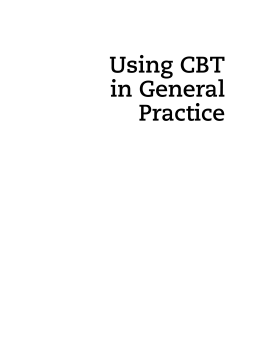
Additional Information
Book Details
Abstract
Using CBT in General Practice, second edition provides GPs with an overview of the basic principles of CBT and shows how these principles can be applied within a typical 10 minute consultation. The book is written in a user-friendly, interactive and practical style and focuses on realistic ways to make CBT work by helping patients to make positive changes to their lives.
Key features of this second edition include:
* case examples to highlight how the techniques can be applied in practice for patients with particular problems or clinical conditions, such as coping with negative thoughts
* problem-solving sections describe how to manage time constraints
* a new consultation model that can be used to implement CBT in general practice
* detailed overviews of the major clinical psychological conditions that can be treated using CBT, such as panic, low self-esteem, and insomnia.
Using CBT in General Practice uniquely provides the practical advice needed to implement CBT within the time constraints of a busy practice – it is therefore essential reading for all GPs, who must now offer CBT as a treatment option. As this is a practical manual and not just a book of theory, it will also appeal to other professionals involved in the management of patients with psychological problems such as practice nurses, health visitors, community psychiatric nurses, practice counsellors and palliative care doctors.
Table of Contents
| Section Title | Page | Action | Price |
|---|---|---|---|
| Contents | 305 | ||
| Introduction | 305 | ||
| Chapter 1 Introduction to CBT | 2 | ||
| Chapter 2 Adapting CBT for general practice | 10 | ||
| Chapter 3 The cognitive-behavioural model | 18 | ||
| Chapter 4 Introducing a cognitive-behavioural approach to patients | 34 | ||
| Chapter 5 Communication skills for CBT | 46 | ||
| Chapter 6 Coping with negative thoughts | 66 | ||
| Chapter 7 Changing unhelpful behaviour | 80 | ||
| Chapter 8 Goal setting and overcoming resistance to change | 92 | ||
| Chapter 9 Overcoming practical problems: problem-solving approaches | 106 | ||
| Chapter 10 Deeper levels of belief: core beliefs and rules | 122 | ||
| Chapter 11 Mindfulness and acceptance | 140 | ||
| Chapter 12 Depression | 154 | ||
| Chapter 13 Insomnia | 170 | ||
| Chapter 14 Anxiety disorders | 182 | ||
| Chapter 15 Health anxiety and medically unexplained symptoms | 206 | ||
| Chapter 16 Chronic physical disease | 226 | ||
| Chapter 17 Functional somatic disorders | 240 | ||
| Chapter 18 Low self-esteem | 260 | ||
| Chapter 19 Managing ‘heartsink’ | 276 | ||
| References and further reading | 292 | ||
| Index | 301 |
